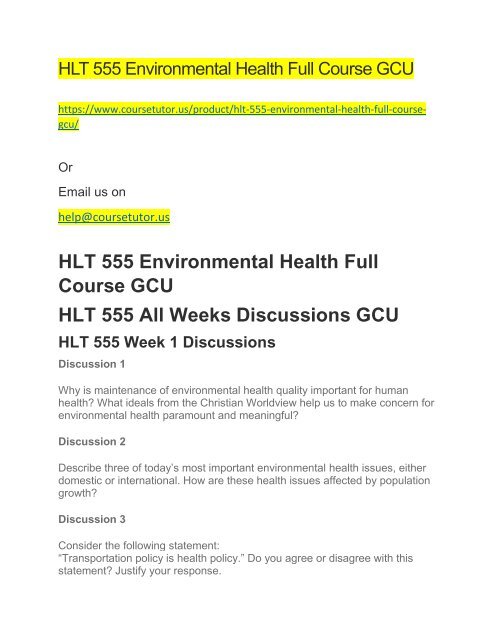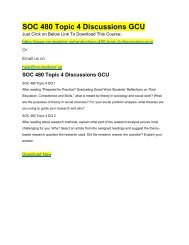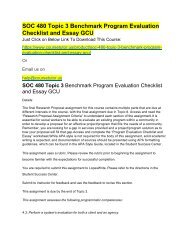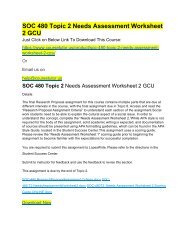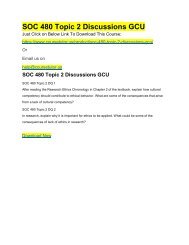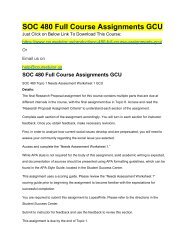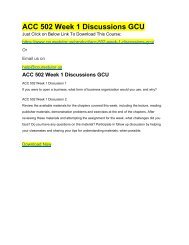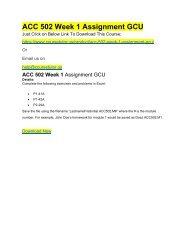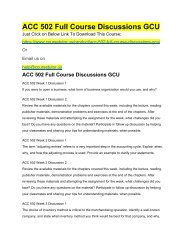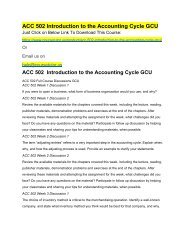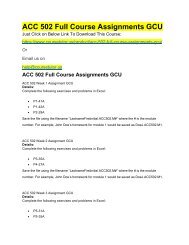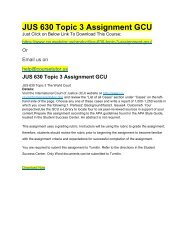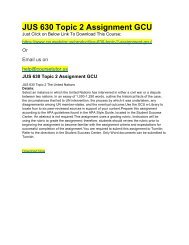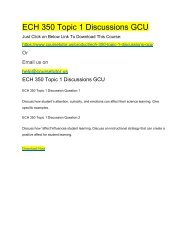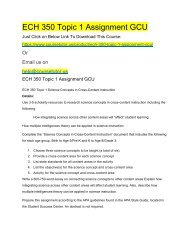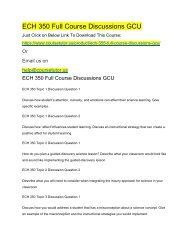HLT 555 Environmental Health Full Course GCU
You also want an ePaper? Increase the reach of your titles
YUMPU automatically turns print PDFs into web optimized ePapers that Google loves.
<strong>HLT</strong> <strong>555</strong> <strong>Environmental</strong> <strong>Health</strong> <strong>Full</strong> <strong>Course</strong> <strong>GCU</strong><br />
https://www.coursetutor.us/product/hlt-<strong>555</strong>-environmental-health-full-coursegcu/<br />
Or<br />
Email us on<br />
help@coursetutor.us<br />
<strong>HLT</strong> <strong>555</strong> <strong>Environmental</strong> <strong>Health</strong> <strong>Full</strong><br />
<strong>Course</strong> <strong>GCU</strong><br />
<strong>HLT</strong> <strong>555</strong> All Weeks Discussions <strong>GCU</strong><br />
<strong>HLT</strong> <strong>555</strong> Week 1 Discussions<br />
Discussion 1<br />
Why is maintenance of environmental health quality important for human<br />
health? What ideals from the Christian Worldview help us to make concern for<br />
environmental health paramount and meaningful?<br />
Discussion 2<br />
Describe three of today’s most important environmental health issues, either<br />
domestic or international. How are these health issues affected by population<br />
growth?<br />
Discussion 3<br />
Consider the following statement:<br />
“Transportation policy is health policy.” Do you agree or disagree with this<br />
statement? Justify your response.
<strong>HLT</strong> <strong>555</strong> Week 2 Discussions<br />
Discussion 1<br />
Why are studies on the health effects of smoking among individual who<br />
smoke not a concern of environmental epidemiology? Explain the reason why<br />
exposure to secondhand cigarette smoke is a concern of this discipline.<br />
Discussion 2<br />
Explain why you and your classmates may have a different response to the<br />
same exposure to a chemical. Provide a specific example.<br />
<strong>HLT</strong> <strong>555</strong> Week 3 Discussions<br />
Discussion 1<br />
What are some examples of environmental sources of exposure of<br />
populations to toxic heavy metals? What factors can exacerbate the effects of<br />
toxic exposures on populations with low socioeconomic status?<br />
Discussion 2<br />
What types of injury of public health concern are associated with exposure to<br />
each of the different forms of radiation? How does the risk of each injury vary<br />
with the dose of the radiation in question?<br />
<strong>HLT</strong> <strong>555</strong> Week 4 Discussions<br />
Discussion 1<br />
How do vectors play a role in the transmission of disease? What are some<br />
procedures for control and prevention? Provide a specific example.<br />
Discussion 2<br />
Unlike other toxins or contaminants with which the public can come into<br />
contact, pesticides are intentionally applied to food, living spaces, and people.
What are some of the risk-benefit issues in the application of pesticides? Is<br />
the risk justified? Explain your position.<br />
<strong>HLT</strong> <strong>555</strong> Week 5 Discussions<br />
Discussion 1<br />
Explore the following statement: “The answer to a waterborne disease<br />
outbreak is to ‘shock’ chlorinate.” What health risks would be mitigated with<br />
this approach? What new health risks might emerge from the application of<br />
large doses of chlorine?<br />
Discussion 2<br />
What actions can be taken to lower air pollution emissions? Consider actions<br />
that can be taken at the individual, community, and government levels.<br />
<strong>HLT</strong> <strong>555</strong> Week 6 Discussions<br />
Discussion 1<br />
What are the different types of solid waste and how are they identified? What<br />
are the different approaches to solid waste management?<br />
Discussion 2<br />
What are some alternatives to sewer systems for disposal of human waste?<br />
To what extent could these alternatives replace municipal sewer systems?<br />
Discuss their advantages and disadvantages.<br />
<strong>HLT</strong> <strong>555</strong> Week 7 Discussions<br />
Discussion 1<br />
Describe the categories of hazards that may be present in foods and suggest<br />
methods for their control and prevention.<br />
Discussion 2
How do food recalls contribute to the safety of our nation’s food supply? What<br />
do you think are some strengths and weaknesses of this process?<br />
<strong>HLT</strong> <strong>555</strong> Week 8 Discussions<br />
Discussion 1<br />
In the United States, occupational health regulations are set by the<br />
Occupational Safety and <strong>Health</strong> Administration (OSHA). What are some of the<br />
major factors that limit the effectiveness of these regulations?<br />
Discussion 2<br />
What is the difference between an unintentional injury and an accident? Why<br />
is it important to make the distinction? Discuss some strategies for highlighting<br />
the difference between accidents and injuries.<br />
Discussion 3<br />
The risks of occupational injury and disease are especially high in poor<br />
countries. Identify a specific occupational health hazard in a developing nation<br />
and recommend a strategy for prevention.<br />
<strong>HLT</strong> <strong>555</strong> All Weeks Assignments <strong>GCU</strong><br />
<strong>HLT</strong> <strong>555</strong> Week 1 <strong>Environmental</strong> <strong>Health</strong> From a Historical Perspective<br />
Paper<br />
Details:<br />
In Silent Spring, Rachel Carson uses a very powerful narrative framework to<br />
describe the world as it exists in harmony and bliss before the fall into the<br />
massive use of poisons in the environment. In 1,000-1,250-words, summarize<br />
the key issues addressed in this publication; discuss how this publication has<br />
contributed to current knowledge and understanding of the dynamic between<br />
the environment and health; and explain the relationship between the<br />
environment and health.
Refer to the assigned readings to incorporate specific examples and details<br />
into your paper. You are required to use a minimum of three additional<br />
references in your paper.<br />
Prepare this assignment according to the APA guidelines found in the APA<br />
Style Guide, located in the Student Success Center. An abstract is not<br />
required.<br />
This assignment uses a grading rubric. Instructors will be using the rubric to<br />
grade the assignment; therefore, students should review the rubric prior to<br />
beginning the assignment to become familiar with the assignment criteria and<br />
expectations for successful completion of the assignment.<br />
You are required to submit this assignment to Turnitin. Refer to the directions<br />
in the Student Success Center. Only Word documents can be submitted.<br />
<strong>HLT</strong> <strong>555</strong> Week 2 <strong>Environmental</strong> Epidemiology Assessment<br />
Details:<br />
Complete the “<strong>Environmental</strong> Epidemiology Assessment.”<br />
APA format is not required, but solid academic writing is expected.<br />
<strong>HLT</strong><strong>555</strong>.v10R.<strong>Environmental</strong>EpidAssessmen_student.docx<br />
<strong>HLT</strong> <strong>555</strong> Week 3 Exposure and Risk Assessment<br />
Details:<br />
This assignment is in two parts:<br />
Part 1: Exposure Assessment Case Study<br />
Read “Cross-sectional Exposure Assessment of <strong>Environmental</strong> Contaminants<br />
in Churchill County, Nevada” by the Centers for Disease Control and<br />
Prevention (2003). Use this case study to complete the Exposure Assessment<br />
form.<br />
Part 2: Risk Assessment Case Study
Read “Illness Associated with Drift of Chloropicrin Soil Fumigant Into a<br />
Residential Area – Kern County, California, 2003.” Use this case study to<br />
complete the Risk Assessment assignment.<br />
<strong>HLT</strong><strong>555</strong>.v10R.RiskAssessment_student.docx <strong>HLT</strong><strong>555</strong>.v10R.ExposureAssess<br />
mentCaseStudy_student.docx<br />
<strong>HLT</strong> <strong>555</strong> Week 4 Global Warming and Vector-Borne Diseases<br />
(Benchmark Assignment)<br />
Details:<br />
In this two-part assignment.<br />
Part 1: Illustration<br />
Illustrate a particular environmental agent and its effect on the environment.<br />
You may use a flow chart, diagram, pictorial, or other instructor-approved<br />
format. The illustration should show:<br />
1. The vector-borne disease.<br />
2. The pathway or chain of the disease.<br />
3. The factors that contribute to the spread of the disease.<br />
4. The effect of the disease.<br />
Part 2: Narrative<br />
In a short narrative (750 words maximum), do the following:<br />
1. Identify the vector-borne disease.<br />
2. Explain in detail the factors contributing to global warming.<br />
3. Describe the effect of global warming on the incidence and prevalence<br />
of the disease.<br />
4. Utilize a minimum of three references to support your claims.<br />
Prepare the narrative portion of the assignment according to APA guidelines<br />
found in the APA Style Guide, located in the Student Success Center. An<br />
abstract is not required.
This assignment uses a grading rubric. Instructors will be using the rubric to<br />
grade the assignment; therefore, students should review the rubric prior to<br />
beginning the assignment to become familiar with the assignment criteria and<br />
expectations for successful completion of the assignment.<br />
You are required to submit teh narrative portion of this assignment to Turnitin.<br />
Refer to the directions in the Student Success Center. Only Word documents<br />
can be submitted to Turnitin.<br />
<strong>HLT</strong> <strong>555</strong> Week 5 Public Service <strong>Health</strong> Announcement<br />
Details:<br />
This is a two-part assignment. Part 1 is a narrative report and Part 2 is a<br />
public service health announcement. You will identify and explain the effect of<br />
the water supply on the development of cholera in developing countries.<br />
Part 1: Report<br />
In a report of 750-1,000-words, address the following:<br />
1. The agent responsible for cholera.<br />
2. The symptoms, treatment, and diagnosis of cholera.<br />
3. Relationship between the water supply and cholera.<br />
4. Public health efforts to reduce cholera illness in developing countries.<br />
Utilize a minimum of three references to support your claims.<br />
Prepare this part of the assignment according to the APA guidelines found in<br />
the APA Style Guide, located in the Student Success Center. An abstract is<br />
not required.<br />
Part 2: Public Service <strong>Health</strong> Announcement<br />
Develop a public service health announcement. The PSHA should:<br />
1. Have a clear message.<br />
2. Be targeted toward a specific audience.<br />
3. Be persuasive in nature.<br />
4. Grab the viewer’s attention.
5. Be brief.<br />
6. Support statements with evidence.<br />
7. Contain photos and text (voice and music are optional).<br />
8. Observe all copyright laws.<br />
You may use iMovie, iPhoto, Photostory for Windows, Windows MovieMaker,<br />
Adobe Premiere Elements, or Web 2.0 tools such as JayCut or Animoto.<br />
Post the PSHA to TeacherTube or SchoolTube. If you do not have an<br />
account, create one and post the PSHA.<br />
APA format is not required for the PSA, but solid academic writing is<br />
expected.<br />
This assignment uses a grading rubric. Instructors will be using the rubric to<br />
grade the assignment; therefore, students should review the rubric prior to<br />
beginning the assignment to become familiar with the assignment criteria and<br />
expectations for successful completion of the assignment.<br />
You are required to submit the report portion of this assignment to Turnitin.<br />
Refer to the directions in the Student Success Center. Only Word documents<br />
can be submitted to Turnitin.<br />
<strong>HLT</strong> <strong>555</strong> Week 7 Reducing the Risk of Foodborne Illnesses<br />
Details:<br />
The Hazard Analysis Critical Control Plan (HACCP) is a system used to<br />
reduce the risk of foodborne illnesses in the United States. Preventing<br />
problems from occurring is the paramount goal underlying any HACCP<br />
system. The principles employed in the development of HACCP plans meet<br />
the goal of preventing foodborne illnesses.<br />
In a PowerPoint presentation of 5-10 slides, describe the history and<br />
application of the HACCP system, addressing the following:<br />
1. Provide a brief history of HACCP.<br />
2. Describe the steps involved in the development and implementation of a<br />
HACCP plan.
3. What are the advantages of using HACCP rather than traditional food<br />
safety programs in retail food establishments?<br />
4. Describe critical control points and critical limits as they are used in<br />
HACCP programs and what happens when there is a deviation.<br />
5. Why is monitoring an important step in the HACCP system?<br />
You are required to use a minimum of three additional references in preparing<br />
your presentation.<br />
APA format is not required, but solid academic writing is expected.<br />
This assignment uses a grading rubric. Instructors will be using the rubric to<br />
grade the assignment; therefore, students should review the rubric prior to<br />
beginning the assignment to become familiar with the assignment criteria and<br />
expectations for successful completion of the assignment.<br />
You are not required to submit this assignment to Turnitin, unless otherwise<br />
directed by your instructor. If so directed, refer to the directions in the Student<br />
Success Center. Only Word documents can be submitted to Turnitin.<br />
<strong>HLT</strong> <strong>555</strong> Week 8 <strong>Health</strong> Impact Assessment (Benchmark Assignment)<br />
(rubric is attached)<br />
Details:<br />
A health impact assessment (HIA), described in Chapter 4 of your textbook, is<br />
a process for describing and estimating the effects a proposed project or<br />
policy may have on the health of a population. For this assignment, imagine<br />
you asked asked to conduct a HIA for a proposed waste management facility<br />
in your community.<br />
In a paper of 1,250-1,500-words address the following questions and issues:<br />
1. Provide an overview and description of the stages of an health impact<br />
assessment. How is it different from other forms of assessment, such as<br />
an environmental impact assessment or a community health<br />
assessment?<br />
2. What information would you need about the proposed project?<br />
3. What information would you need about the community to understand<br />
the potential health effects?
4. What recommendations would you propose to promote positive health<br />
effects? What recommendations would you propose to mitigate adverse<br />
health effects?<br />
5. Which decision makers would need this information? Why?<br />
You are required to use a minimum of five additional references in your paper.<br />
Prepare this assignment according to the APA guidelines found in the APA<br />
Style Guide, located in the Student Success Center. An abstract is not<br />
required.<br />
This assignment uses a grading rubric. Instructors will be using the rubric to<br />
grade the assignment; therefore, students should review the rubric prior to<br />
beginning the assignment to become familiar with the assignment criteria and<br />
expectations for successful completion of the assignment.<br />
You are required to submit this assignment to Turnitin. Refer to the directions<br />
in the Student Success Center. Only Word documents can be submitted to<br />
Turnitin.<br />
Download Now


